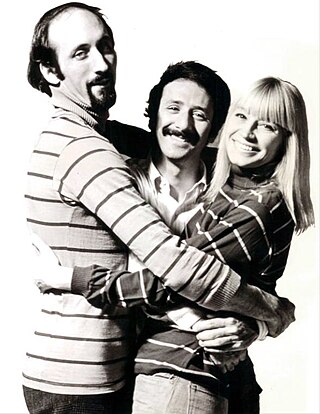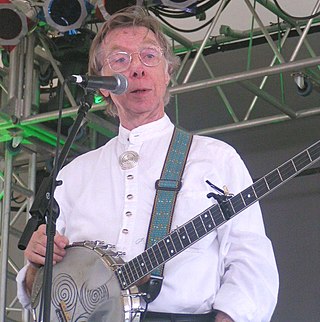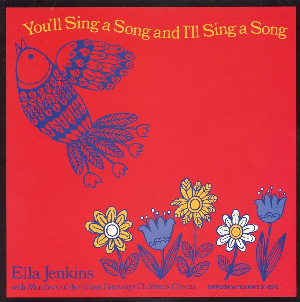See also
- "Mary Mac", a 1996 song by the Blackeyed Susans
Mary Mack is a clapping game played by children.
Mary Mack may also refer to:

Peter, Paul and Mary was an American folk group formed in New York City in 1961 during the American folk music revival phenomenon. The trio consisted of tenor Peter Yarrow, baritone Paul Stookey, and contralto Mary Travers. The group's repertoire included songs written by Yarrow and Stookey, early songs by Bob Dylan, and covers of other folk musicians. They were enormously successful in the early- and mid-1960s, with their debut album topping the charts for weeks, and helped popularize the folk music revival. After the death of Travers in 2009, Yarrow and Stookey continued to perform as a duo under their individual names.
This is a list of notable events in music that took place in the year 1941.
"Mack the Knife" or "The Ballad of Mack the Knife" is a song composed by Kurt Weill with lyrics by Bertolt Brecht for their 1928 music drama The Threepenny Opera. The song sings about a knife-wielding criminal of the London underworld from the musical named Macheath, the "Mack the Knife" of the title.

Samuel John "Lightnin" Hopkins was an American country blues singer, songwriter, guitarist and occasional pianist from Centerville, Texas. In 2010, Rolling Stone magazine ranked him No. 71 on its list of the 100 greatest guitarists of all time.
Mary Jane may refer to:

Harry Warren was an American composer and the first major American songwriter to write primarily for film. He was nominated for the Academy Award for Best Original Song eleven times and won three Oscars for composing "Lullaby of Broadway", "You'll Never Know" and "On the Atchison, Topeka and the Santa Fe". He wrote the music for the first blockbuster film musical, 42nd Street, choreographed by Busby Berkeley, with whom he would collaborate on many musical films.

Mary Chapin Carpenter is an American country and folk music singer-songwriter. Carpenter spent several years singing in Washington, D. C.-area clubs before signing in the late 1980s with Columbia Records. Carpenter's first album, 1987's Hometown Girl, did not produce any charting singles. She broke through with 1989's State of the Heart and 1990's Shooting Straight in the Dark.
Shine may refer to:

Mack Gordon was an American composer and lyricist for the stage and film. He was nominated for the best original song Oscar nine times in 11 years, including five consecutive years between 1940 and 1944, and won the award once, for "You'll Never Know". That song has proved among his most enduring, and remains popular in films and television commercials to this day. "At Last" is another of his best-known songs.
"Miss Susie had a steamboat", also known as "Hello Operator", "Miss Suzy", "Miss Lucy", and many other names, is the name of an American schoolyard rhyme in which each verse leads up to a rude word or profanity which is revealed in the next verse as part of an innocuous word or phrase. Originally used as a jump-rope rhyme, it is now more often sung alone or as part of a clapping game. Hand signs sometimes accompany the song, such as pulling on the bell in the first verse or making a phone gesture in the second.

Thomas Makem was an Irish folk musician, artist, poet and storyteller. He was best known as a member of the Clancy Brothers and Tommy Makem. He played the long-necked 5-string banjo, tin whistle, low whistle, guitar, bodhrán and bagpipes, and sang in a distinctive baritone. He was sometimes known as "The Bard of Armagh" and "The Godfather of Irish Music".

Craig Jamieson Mack was an American rapper and record producer, and was famous during his tenure under Bad Boy Records.

Jack Owen Ingram is an American country music artist formerly signed to Big Machine Records, an independent record label. He has released eleven studio albums, one extended play, six live albums, and 19 singles. Although active since 1992, Ingram did not reach the U.S. Country Top 40 until the release of his single "Wherever You Are" late-2005. A number one hit on the Billboard country charts, that song was also his first release for Big Machine and that label's first Number One hit. Ingram has sent six other songs into the country Top 40 with "Love You", "Lips of an Angel", "Measure of a Man", "Maybe She'll Get Lonely", "That's a Man", and "Barefoot and Crazy".
The English Folk Dance and Song Society is an organisation that promotes English folk music and folk dance. EFDSS was formed in 1932 when two organisations merged: the Folk-Song Society and the English Folk Dance Society. The EFDSS, a member-based organisation, was incorporated in 1935 and became a registered charity in 1963.
"Keep Your Eyes on the Prize" is a folk song that became influential during the American Civil Rights Movement of the 1950s and 1960s. It is based on the traditional song, "Gospel Plow," also known as "Hold On," "Keep Your Hand on the Plow," and various permutations thereof.
Mary Mack is a Scottish folk song, and is also a patter song, often sung not only with a rapid to very rapid tempo but increasing toward the end.

"You Don't Have to Worry" is a song by American R&B singer Mary J. Blige. It was written by Kenny Greene and Edward "DJ Eddie F" Ferrell for the soundtrack of the film Who's the Man? (1993), while production was helmed by Ferrell, with co-production from Kenny "K-Smoove" Kornegay and Darin "Piano Man" Whittington. It contains a sample of "Papa Don't Take No Mess" by James Brown. Released as a single, it charted on the US Billboard Hot 100, peaking at number 63, while reaching number 11 on the Billboard Hot R&B/Hip-Hop Songs. A remix version featuring rapper Craig Mack was produced by Sean "Puffy" Combs and Tony Dofat and later included on Blige's remix album, What's the 411? Remix (1993).

You'll Sing a Song and I'll Sing a Song is an album by folk singer Ella Jenkins. She is joined by members of the Urban Gateways Children's Chorus. It was later added into the National Recording Registry. The composition "You'll Sing a Song and I'll Sing a Song" was added to the National Recording Registry by the Library of Congress in 2007.

Peter Yarrow is an American singer and songwriter who found fame for being in the 1960s folk trio Peter, Paul and Mary. Yarrow co-wrote one of the group's best known hits, "Puff, the Magic Dragon". He is also a political activist and has supported causes that range from opposition to the Vietnam War to school anti-bullying programs.
Mikelle Louise Budge, professionally known as Mary Mack, is an American comedian, musician, and writer. Mack currently stars as Jesse Wearsprada Solar-Opposites in the Justin Roiland-produced animated sitcom Solar Opposites, which debuted May 8, 2020 on Hulu. She has released five albums of her stand-up.